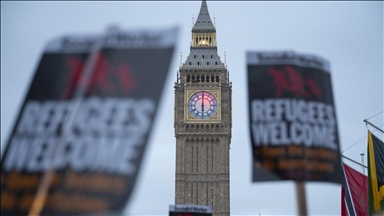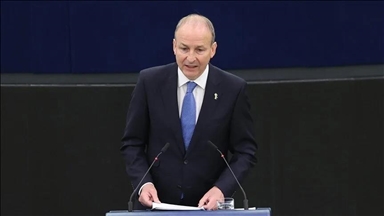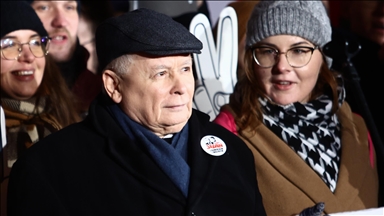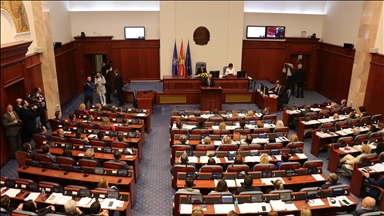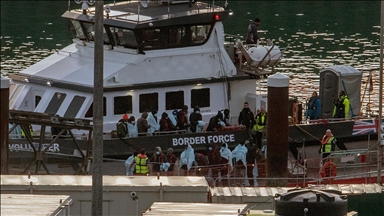OPINION - The reality of the EU delegation's visit to Cairo: Hypocrisy and double standards
The main goal is to block migrants’ departures by financially supporting some crucial transit countries, such as Egypt
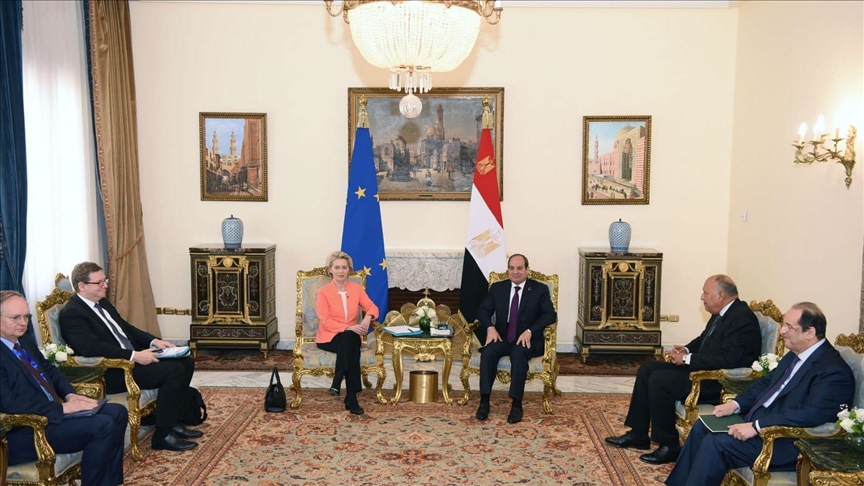
- The main goal is to block migrants’ departures by financially supporting some crucial transit countries, such as Egypt
- The lack of care towards the Palestinians and the humanitarian tragedy unfolding in Gaza is certainly questionable, especially in terms of ethics and political consistency
The author is an Italian academic expert on Political Science and International Relations. She is the scientific director of the Observatory in Türkiye by CeSPI.
ISTANBUL
It seems that March 17, 2024, will mark a historic date. A European delegation, led by the president of the commission Ursula Von der Leyen, who was accompanied by five heads of state or government (Greece, Greek Cypriot administration, Austria, Belgium and Italy) paid a visit to Egyptian President Abdel Fattah al-Sisi in Cairo.
Undoubtedly, the summit was of crucial importance, not only for the scenic significance of the event along with the contents of the signed agreements, but above all for the timing. Although the joint parties have declared mutual opposition to Israel's planned ground offensive in Rafah - which has already been aired too many times; hence, it is presumably plausible-, Europe's priorities primarily concern the containment of migratory flows. Indeed, a financing and investment package of €7.4 billion ($8 billion) will be implemented in the next 4 years in Egypt, in line with the already well-established European approach aiming at outsourcing migration control.
A prolonged European inefficiency
In other words, following the spirit of the memorandums already signed with Türkiye in 2016 and more recently with Tunisia and Mauritania, the main goal is to block migrants’ departures by financially supporting some crucial transit countries, such as Egypt.
Indeed, given the exacerbation of the situation in the region and the escalation of Israel’s war on Palestine, Europe fears new massive flows. As a matter of fact, the contingency once again shows the prolonged European inefficiency in coping with migration, as well as a sort of widespread western hypocrisy when it comes to Israel. Despite in Cairo the European representatives have, at least rhetorically, expressed the need to avoid the Israeli offensive on Rafah “at all costs” and the urgent call for a “rapid cease-fire”; hence the “risk of massive famine,” many chancelleries are continuously conveying their support and sympathies to the Israeli government by legitimizing its “right to self-defense.”
On the other hand, to some extent, al-Sisi’s fear of forced displacement and the blockade of Rafah crossing gate match the concerns of the EU on the risk of new migration flow. By reaffirming Egypt's rejection "of any forced movement of Palestinians beyond the Strip, which would have the effect of vanishing the Palestinian cause,” al-Sisi emphasized the need to aid more effectively the population crushed by war.
Hence, as a strengthened cooperation in the health sector to help civilians arriving from Gaza was also signed, either bilaterally or at the European level, the EU has seen the Egyptian leader as a “reliable and strategic partner also at global level,” thus it necessarily elevates him as an ideal mediator in the Israeli war on Gaza. Therefore, in Egypt, the EU aims at funding investments in order to incentivize domestic economic activities with the final goal of restricting the margins of fleeing the country. Migration is indeed a main issue for Cairo, which is facing the effects of the humanitarian crises in Sudan, Syria and Palestine in terms of massive refugee inflows.
EU convenience and political calculations
Moreover, as the deal coincides with a surge in irregular migrants arriving to Europe via the Mediterranean Sea, these maneuvers aim to curb irregular migration to the European borders also in a time of political campaign for the next EU elections to be held in June.
However, the fact that Italian Prime Minister Giorgia Meloni proposed the European mission in Cairo is very meaningful, as Italy has specific interests in Egypt and in the region. From the Italian perspective, the good outcome of the summit has some national political implications. Indeed, bilaterally Italy and Egypt signed 10 memorandums of understanding in various sectors to be read into the big frame of the Italian Africa Plan, so-called "Mattei plan," whose main goal is also contrasting illegal migration.
Aiming at leading the European approach to Africa, Meloni intends to deal with migration issues systematically by directly intervening in the hosting or transit countries in order to create sustainable solutions throughout the establishment of economic partnerships. As the plan brings some political dividends, Meloni is trying to build up as well in terms of international credibility and mediator, by leveraging on the momentum of G7 Italian presidency.
Leaving Palestine and Gaza behind
Nevertheless, politically the alliance with von der Leyen might not pay off since the convenience was made upon migration issues and certain shared approaches, including their favor towards Israel in the current war on Gaza, by assuming that on those issues there was a general agreement in the public opinion. Instead, this alliance appears to be superficial and probably it has been already discouraging part of the traditional electorate.
As a matter of fact, Meloni's right-wing government has necessarily moderated its stances, aligning itself with Brussels and Washington’s dictat also regarding the Israeli-Palestinian issue. It is worth noting that in its recent political history, Italy has always maintained a certain equidistant position between the parties, while currently, it opts for a pro-Israel stance. The lack of care toward the Palestinians and the humanitarian tragedy unfolding in Gaza is certainly questionable, especially in terms of ethics and political consistency. While some topics and issues are of primary interest, the EU is promptly entangling them, although without direct involvement, by externalizing responsibilities. Lately, this has been the European political trend: when necessary, coming to terms, preserving the 27-member bloc’s order and benefits, and defending the integrity by eventually adopting hypocritical behaviors and double standards. At this point, a small reminder is much needed; flowering a garden requires vision, assumption of responsibility, awareness of the surrounding context, actions and a certain congruence of values.
*Opinions expressed in this article are the author’s own and do not necessarily reflect the editorial policy of Anadolu.
Anadolu Agency website contains only a portion of the news stories offered to subscribers in the AA News Broadcasting System (HAS), and in summarized form. Please contact us for subscription options.


